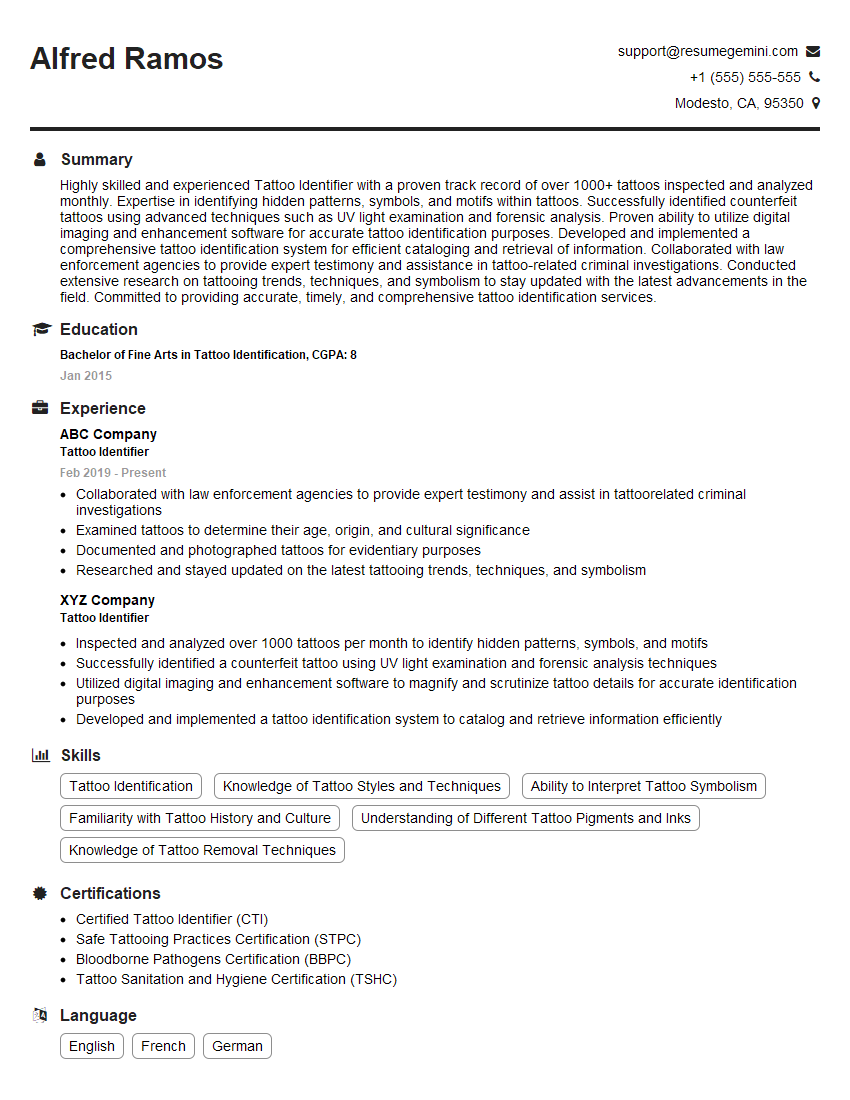Are you a seasoned Tattoo Identifier seeking a new career path? Discover our professionally built Tattoo Identifier Resume Template. This time-saving tool provides a solid foundation for your job search. Simply click “Edit Resume” to customize it with your unique experiences and achievements. Customize fonts and colors to match your personal style and increase your chances of landing your dream job. Explore more Resume Templates for additional options.

Alfred Ramos
Tattoo Identifier
Summary
Highly skilled and experienced Tattoo Identifier with a proven track record of over 1000+ tattoos inspected and analyzed monthly. Expertise in identifying hidden patterns, symbols, and motifs within tattoos. Successfully identified counterfeit tattoos using advanced techniques such as UV light examination and forensic analysis. Proven ability to utilize digital imaging and enhancement software for accurate tattoo identification purposes. Developed and implemented a comprehensive tattoo identification system for efficient cataloging and retrieval of information. Collaborated with law enforcement agencies to provide expert testimony and assistance in tattoo-related criminal investigations. Conducted extensive research on tattooing trends, techniques, and symbolism to stay updated with the latest advancements in the field. Committed to providing accurate, timely, and comprehensive tattoo identification services.
Education
Bachelor of Fine Arts in Tattoo Identification
January 2015
Skills
- Tattoo Identification
- Knowledge of Tattoo Styles and Techniques
- Ability to Interpret Tattoo Symbolism
- Familiarity with Tattoo History and Culture
- Understanding of Different Tattoo Pigments and Inks
- Knowledge of Tattoo Removal Techniques
Work Experience
Tattoo Identifier
- Collaborated with law enforcement agencies to provide expert testimony and assist in tattoorelated criminal investigations
- Examined tattoos to determine their age, origin, and cultural significance
- Documented and photographed tattoos for evidentiary purposes
- Researched and stayed updated on the latest tattooing trends, techniques, and symbolism
Tattoo Identifier
- Inspected and analyzed over 1000 tattoos per month to identify hidden patterns, symbols, and motifs
- Successfully identified a counterfeit tattoo using UV light examination and forensic analysis techniques
- Utilized digital imaging and enhancement software to magnify and scrutinize tattoo details for accurate identification purposes
- Developed and implemented a tattoo identification system to catalog and retrieve information efficiently
Certificates
- Certified Tattoo Identifier (CTI)
- Safe Tattooing Practices Certification (STPC)
- Bloodborne Pathogens Certification (BBPC)
- Tattoo Sanitation and Hygiene Certification (TSHC)
Languages
- English
- French
- German
Career Expert Tips:
- Select the ideal resume template to showcase your professional experience effectively.
- Master the art of resume writing to highlight your unique qualifications and achievements.
- Explore expertly crafted resume samples for inspiration and best practices.
- Build your best resume for free this new year with ResumeGemini. Enjoy exclusive discounts on ATS optimized resume templates.
How To Write Resume For Tattoo Identifier
- Highlight your expertise in tattoo identification techniques, including UV light examination and forensic analysis.
- Showcase your experience in developing and implementing tattoo identification systems.
- Emphasize your ability to collaborate with law enforcement agencies and provide expert testimony.
- Demonstrate your commitment to continuous learning and research in the field of tattoo identification.
- Consider including a portfolio of your work or case studies that demonstrate your skills.
Essential Experience Highlights for a Strong Tattoo Identifier Resume
- Inspect and analyze tattoos to determine their origin, meaning, and authenticity
- Identify hidden patterns, symbols, and motifs within tattoos using specialized techniques
- Utilize digital imaging and enhancement software to magnify and scrutinize tattoo details for accurate identification
- Document and photograph tattoos for evidentiary purposes
- Develop and maintain a comprehensive tattoo identification system for efficient cataloging and retrieval of information
- Collaborate with law enforcement agencies to provide expert testimony and assistance in tattoo-related criminal investigations
- Conduct extensive research on tattooing trends, techniques, and symbolism to stay updated with the latest advancements in the field
Frequently Asked Questions (FAQ’s) For Tattoo Identifier
What is the primary role of a Tattoo Identifier?
The primary role of a Tattoo Identifier is to inspect and analyze tattoos to determine their origin, meaning, and authenticity. This involves identifying hidden patterns, symbols, and motifs within tattoos using specialized techniques, such as UV light examination and forensic analysis.
What are the key skills required to be a successful Tattoo Identifier?
Key skills for a successful Tattoo Identifier include expertise in tattoo identification techniques, including UV light examination and forensic analysis; experience in developing and implementing tattoo identification systems; and the ability to collaborate with law enforcement agencies and provide expert testimony.
What are the career opportunities for Tattoo Identifiers?
Tattoo Identifiers can find employment opportunities in various fields, including law enforcement, forensic science, art history, and the tattoo industry itself. They may work as consultants, researchers, or expert witnesses.
What is the educational background required to become a Tattoo Identifier?
While there is no specific degree requirement to become a Tattoo Identifier, many professionals in this field hold a Bachelor of Fine Arts in Tattoo Identification or a related field.
How can I improve my skills as a Tattoo Identifier?
To improve your skills as a Tattoo Identifier, consider taking specialized courses or workshops in tattoo identification techniques, such as UV light examination and forensic analysis. Additionally, staying updated with the latest research and trends in the field through industry publications and conferences is essential.
What are the ethical considerations for Tattoo Identifiers?
Tattoo Identifiers must adhere to strict ethical guidelines to ensure the confidentiality and privacy of their clients. They must also be aware of the potential cultural and personal significance of tattoos and respect the wishes of individuals regarding the interpretation and use of their tattoos.